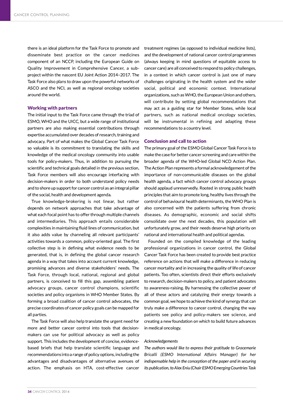
Force) and Andreas Ullrich (WHO Medical Officer Cancer Control
and Liaison IARC) for their comments and advice, and to
Meggan Harris (Editorial Research Assistant, University of
Valencia) for her support in bringing this paper to successful and
timely submission. l
Jose M Martin-Moreno, MD, PhD, DrPH received his medical and
public health education and training from the University of
Granada (Spain) and Harvard University (USA). His main
speciality is preventive medicine and public health, with
particular emphasis on health policy and cancer control. In
addition to his professorship at the University of Valencia, he is
the Coordinator of the Quality Unit at the Valencian Clinical
Hospital and advises the WHO Regional Office for Europe, where
he previously served as Director of Programme Management. A
founding member of the European Academy of Cancer Sciences,
he is an active member of ESMO and the ESMO Public Policy
Committee, and has also advised the European Institute of
Oncology and the International Agency for Research on Cancer
(IARC), as well as having published more than 300 scientific
papers both nationally and internationally.
Eduardo Cazap, MD, PhD, FASCO is the founder and first
President of the Latin American and Caribbean Society of Medical
Oncology (SLACOM), Immediate Past President of the Union for
International Cancer Control (UICC-Geneva) and member of the
Executive Committee of the National Cancer Institute of
Argentina. He has published over 180 papers and his main areas
of interest are global health, cancer control and prevention, breast
and cervical cancer and independent clinical research. He is
Chairman of the Executive Committee of the Breast Health Global
Initiative (BHGI), Seattle, USA and President of the UICC World
Cancer Congress in Montreal, Canada, in 2012. Dr Cazap was
also Co-chair, Civil Society Task Force at the 2011 United Nations
High-Level Meeting on Non-communicable Diseases, Chairman of
the International Clinical Trials Working Group (ICTWG)-
American Society of Clinical Oncology (ASCO) and Chairman of
the Scientific Council of the International School of Senology (SIS),
Strasbourg, France. Dr Cazap is currently Deputy Chair of the
ESMO Emerging Countries Committee.
David J Kerr, CBE, FRCP, FMedSci has made sustained and
internationally recognized contributions to cancer care and
research and has published over 400 papers in high profile
journals, authored over 20 books including the Oxford Textbook
of Oncology, and has been awarded four prestigious,
international research prizes. He has been elected Fellow of
Academy of Medical Sciences, President of ESMO and Founding
Fellow of the European Academy of Cancer Sciences. He
organized the African Cancer Reform convention in London
(www.afrox.org) calling for immediate action to develop cancer
control plans in Africa. In addition to his professorship at Oxford
University, he has supported British prime ministers (Tony Blair
and David Cameron) as health adviser, and has served on Qatar's
Supreme Health Council.
CANCER CONTROL PLANNING
CANCER CONTROL 2014 35
References
1. Luengo-Fernandez R, Leal J, Gray A, Sullivan R. Economic burden of cancer across the
European Union: a population-based cost analysis. The Lancet Oncology 2013;
14:1165-1174.
2. The NCD Alliance. The Global Epidemic. Geneva: The NCD Alliance; 2013. Available
from: http://www.ncdalliance.org/globalepidemic [Last accessed Dec 8, 2013].
3. General Assembly of the United Nations. 2011 High Level Meeting on the Prevention
and Control of Non-communicable Diseases. New York: United Nations;
2011.available from: http://www.un.org/en/ga/ncdmeeting2011/ [Last accessed Dec
9, 2013].
4. World Health Organization. Global Action Plan for the Prevention and Control of NCDs
2013-2020. Geneva: World Health Organization; 2013. Available from:
http://www.who.int/nmh/en/ [Last accessed Dec 9, 2013].
5. World Health Assembly. Follow-up to the Political Declaration of the High-level Meeting of
the General Assembly on the Prevention and Control of Non-communicable Diseases -Doc.
WHA66.10. Geneva: World Health Organization; 2013. Available from:
http://apps.who.int/gb/ebwha/pdf_files/wha66/a66_r10-en.pdf [Last accessed Dec
9, 2013].
6. European Society for Medical Oncology. 2011 UN Summit on Non-Communicable
Diseases. Lugano: ESMO; 2013.available from: http://www.esmo.org/policy/politicalinitiatives/2011-un-summit-on-non-communicable-diseases.
[Last accessed Dec 9,
2013].
7. European Society for Medical Oncology.2011 UN Summit on Non-Communicable
Diseases. Lugano: ESMO; 2013. Available from: http://www.esmo.org/policy/politicalinitiatives/2011-un-summit-on-non-communicable-diseases.
[Last accessed Dec 9,
2013].
8. Porter ME. What is Value in Health Care? White Paper. Boston: Harvard Business
School, Institute for Strategy and Competitiveness; 2008.
9. Cherny NI, Cleary J, Scholten W et al. The Global Opioid Policy Initiative (GOPI)
project to evaluate the availability and accessibility of opioids for the management of
cancer pain in Africa, Asia, Latin America and the Caribbean, and the Middle East:
introduction and methodology. Ann Oncol 2013; 24 (Supplement 11): xi7-xi13.
10. European Society for Medical Oncology.2011 UN Summit on Non-Communicable
Diseases. Lugano: ESMO; 2013. Available from: http://www.esmo.org/policy/politicalinitiatives/2011-un-summit-on-non-communicable-diseases
[Last accessed Dec 9,
2013].
11. International Cancer Control Partnership. Union for International Cancer Control;
2013. Available from: http://www.iccp-portal.org/ [Last accessed Dec 10, 2013].
12. Albreht T, Jelenc M, Gorgojo L. From 'on paper' to 'into action': development of cancer
control programmes in the EU. In: Martin-Moreno JM, Albreht T, Rados S, editors.
Boosting Innovation and Cooperation in European Cancer Control: key findings from
the European Partnership for Action Against Cancer. Ljubljana: National Institute of
Public Health of the Republic of Slovenia; 2013. Also available from:
http://www.epaac.eu/images/of_ljubljana/cancer_book_web_version.pdf [Last
accessed Dec 10, 2013].